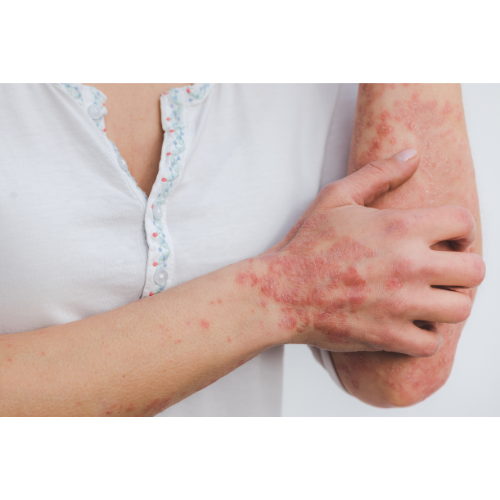Difference Between Psoriasis and Dermatitis
Difference between Eczema and Psoriasis
Similarities between Eczema and Psoriasis
Eczema
Eczema, also termed as atopic dermatitis is the general inflammation of the skin in which skin also becomes dry, bumpy, itchy and red. Eczema is common in infants and children. The itching is more intense and persistent. It is more related to irritation from substances and allergies. There is even bleeding due to too much scratching. Affects hand, face and bending body parts like the elbows and knees.
Psoriasis
Psoriasis is an immune-mediated skin disease in which skin cells build up causing raised, silvery and scaly patches on very inflamed skin. It is most common between the ages of 15-35. There is more stinging and burning sensation. It is believed to be caused by genetics, emotional stress, infections, skin sensitivity due to wounds and effects of medications. It shows up in skin folds, palms, feet, scalp, low back and nail beds.
Difference between Eczema & Psoriasis
1. Definition
Eczema
Eczema, also termed as atopic dermatitis is a chronic skin condition and is defined as an itchy inflammation of the skin where the skin becomes red, patchy, dry, and bumpy. The symptoms usually appear on the arms and behind the knees
Psoriasis
It is an autoimmune disease in which the skin cells build up and result in itchy, scaly, and dry patches. It is triggered by immune system problem and the most common symptom is rash on the skin. Basically, the skin cells are replaced more quickly than usual.
2. Symptoms
Eczema
- Extreme dryness and itchiness
- Less inflammation than psoriasis
- Skin darkening around the eyes
- Oozing and crusting
- Rough, leathery, or scaly skin, that appears as scaly patches
Psoriasis
- Painful and stinging inspiration
- Mild dryness and itchiness
- Skin appears thick
-
Types
Eczema
- Atopic eczema
- Discoid Eczema
- Xerotic Eczema
- Venous Eczema
- Papular Eczema
- Dyshidrotic Eczema or pompholyx Eczema
Psoriasis
- Guttate Psoriasis
- Inverse Psoriasis
- Pustular Psoriasis
- Erythrodermic Psoriasis
- Nail Psoriasis
- Psoriatic Arthritis
- Plaque Psoriasis
-
Triggers
Eczema
Eczema could be triggered by:
- Soaps
- Dust
- Mould
- Disinfectants
- Juices from meats and produce
- Detergents
- Pets
- Pollen
- Dandruff
- Some foods
Psoriasis
Psoriasis could get triggered by:
- Vaccination
- Sunburn
- Stress
- Infection
- Scratches
Summary of Psoriasis vs Ezcema
The points of difference between Eczema & Psoriasis have been summarized as below:
| Characteristics | Eczema | Psoriasis |
| Appearance on skin | Red or pink patches on light skin, darker patches, on darker skin tones | Red to brown inflamed patches |
| Common in | Common in infants and children | Common in adults |
| Itchiness | Eczema causes intense itch | Psoriasis also causes itchiness but in addition it also can cause stingy and burning skin and gives a feeling as if people are being bitten by far-ants |
| Flare-ups | Flare-ups are borderless and found in folds of skin | Flare-ups are obvious and distinctive |
| Treatments | Topical corticosteroids, or steroids | Topical treatments, phototherapy (use of ultraviolet light), systemic medications (prescription drugs that work throughout your body) |
Summary of Psoriasis vs Ezcema:
Eczema, or Atopic Dermatitis, and Psoriasis are both chronic skin conditions, but they differ in their causes, symptoms, and appearance.
Eczema, often appear in childhood, is characterized by red, inflamed skin, intense itching, and fluid-filled blisters. Commonly found in flexural areas, face, hands, and feet, it stems from a combination of genetic, environmental, and immune factors.
Psoriasis can occur at any age and is distinguished by well-defined, raised patches covered with silvery scales. It can affect various body parts, including the scalp and joints, and is driven by an autoimmune response leading to accelerated skin cell turnover.
Both conditions share some similarities, such as periods of exacerbation and remission, requiring proper skincare and moisturization.
Treatment approaches vary, with eczema often managed using topical steroids and antihistamines, while psoriasis may involve topical steroids, phototherapy, and systemic medications.
FAQ:
How do I know if it’s eczema or psoriasis?
Psoriasis usually caused itching that is milder in comparison to eczema. Also, in some fewer common types of psoriasis, a horrible burn. Itching in eczema is intense and sometimes it is so severe that people start to scratch their skin so that it bleeds. Eczema happens in the folds of the skin. Psoriasis happens on the other side of those creases.
Can eczema turn into psoriasis?
Though eczema and psoriasis both are skin conditions and have similar symptoms, these are two separate diseases. Eczema is a chronic skin disease and psoriasis is an autoimmune disease, So, it’s not possible for eczema to turn into psoriasis.
What is the difference between scalp eczema and psoriasis?
Though both psoriasis and eczema show common symptoms such as itching and red patches on the scalp, eczema does not appear as dry or thick scale on the scalp. Also, eczema scales that appear on the scalp possess yellowish or whitish hue and psoriasis scale appears silvery.
What is the difference between eczema seborrhea and psoriasis?
The scales of psoriasis in appearance are dry and thick in appearance in comparison to the scales of seborrheic dermatitis. Psoriasis has more of a tendency to extend beyond the hairline. In addition, psoriasis usually affects more than one area of the body.
Which is worse eczema or psoriasis?
Psoriasis is worse than eczema as it is typically more inflammatory than eczema.
What is the root cause of psoriasis?
Psoriasis happens when skin cells grow faster and are replaced more quickly than usual. The exact cause of psoriasis is not known, but scientific evidence suggest that the trigger is issues in the immune system and sometimes genetics. The body produces fresh and new skin cells in the skin’s deepest layers.
What cream helps psoriasis?
Retinoids, like tazarotene (Tazorac), Tapinarof (Vtama), Pimecrolimus (Elidel) and tacrolimus (Protopic) and Calcipotriol ointment/cream
What triggers eczema?
Some common triggers to cause eczema include irritants like detergents and soaps, dish washing bars, shampoos with synthetic ingredients, bubble bath bombs. Some environmental factors or allergens also could trigger eczema like moisture, wetness and dampness, moulds, mites, fur from pets, pollens, and cold and dry weather.
Is eczema an autoimmune disease?
There is some evidence that one type of eczema called as, atopic dermatitis, may be autoimmune in nature.
- Difference Between Global Warming and Greenhouse Effect - May 18, 2024
- Difference Between Vaccination and Immunization - March 3, 2024
- Difference Between Selective Mutism and Autism - February 25, 2024
Search DifferenceBetween.net :
Leave a Response
References :
[0]Garzorz‐Stark, N., Krause, L., Lauffer, F., Atenhan, A., Thomas, J., Stark, S. P., ... & Eyerich, K. (2016). A novel molecular disease classifier for psoriasis and eczema. Experimental dermatology, 25(10), 767-774.
[1]Gudjonsson, J. E., Johnston, A., Sigmundsdottir, H., & Valdimarsson, H. (2004). Immunopathogenic mechanisms in psoriasis. Clinical & Experimental Immunology, 135(1), 1-8.
[2]Sohn, A., Frankel, A., Patel, R. V., & Goldenberg, G. (2011). Eczema. Mount Sinai Journal of Medicine: A Journal of Translational and Personalized Medicine, 78(5), 730-739.
[3]Images from Canva


